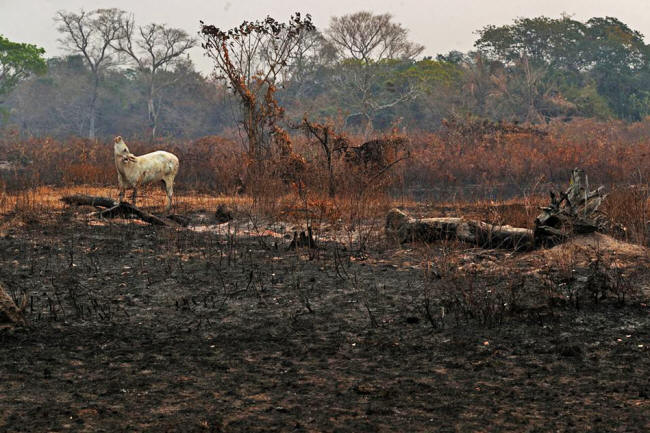|

by Sarah El Safty and Simon Jessop
November 10,
2022
from
Reuters Website

A cow stands amongst an area that
was
burnt in a fire at a ranch in the Pantanal,
the
world's largest wetland, in Pocone,
Mato
Grosso state, Brazil, August 27, 2020.
REUTERS/Amanda Perobelli
World famine is all but guaranteed as the UN blames
farming and ranching for over one-third of so-called
'greenhouse gas emissions,' and then seeks to impose
policies to limit those emissions.
Restricting farming and ranching reduces life-sustaining
food needed to keep humans from going extinct.
The
UN is trying to refocus an existing $18 trillion
investment into solving the 'food problem'...
Source
COP27:
UN food agency
plan on farming
emissions
to launch by
next year
after investor
push...
The U.N. food agency
(FAO)
aims to launch a plan within the year to make the world's food
system more sustainable, a senior executive told Reuters on the
sidelines of the
COP27 climate talks in Egypt.
The plan would show how
the food industry and farming can
align with the world's goal of capping 'global
warming' at 1.5 degrees Celsius, Food and Agriculture
Organization Deputy Director Zitouni Ould-Dada said.
The hope is that such a plan would act in a similar way to the
release of a report for the energy sector by the International
Energy Agency, which spurred investment into companies, projects
and technologies aligned with 'the plan'...
"It's much needed
because for the energy sector there are clear roadmaps which
really attracted a lot of investors... but for agriculture we
don't have such a map," Ould-Dada said.
More than
forty investors managing a combined
$18 trillion urged the FAO in June to,
create a plan to curb
emissions in the sector, often overlooked in global warming
debates yet one of the biggest sources of climate-'damaging'
emissions...
As Russia's invasion
of Ukraine has driven a surge in
food prices globally, compounding the food insecurity caused by
climate change, delegates at the conference were more open to
discussing the issue, Ould-Dada said.
"There has never been
this much attention to food and agriculture anytime before.
This COP is
definitely the one."
The initiative has
already drawn the support of former U.N. Secretary General Ban Ki-moon
and former U.N. climate agency chief Christiana Figueres, and
is slowly gaining the attention of some governments, Ould-Dada
added.
Food production
accounts for around a third of global greenhouse gas emissions
and is the main threat to 86% of the world's species at risk of
extinction, while cattle ranching is responsible for three
quarters of Amazon rainforest loss.
Investors are hoping the
roadmap will provide guidance on matters such as methane emission
limits, and support to ensure a 'Just Transition' for farmers,
said Jeremy Coller, chair of the
FAIRR Initiative, organizers of the
investor-led campaign.
Livestock accounts for nearly a third of the global methane
emissions linked to human activity, released in the form of cattle
burps, manure and the cultivation of feed crops.
"We welcome the FAO's
commitment to producing a roadmap for food and agriculture which
will provide much needed clarity to both companies and
investors, which will allow companies to plan for the transition
and investors to assess investment risk and opportunities,"
Coller said.
|


